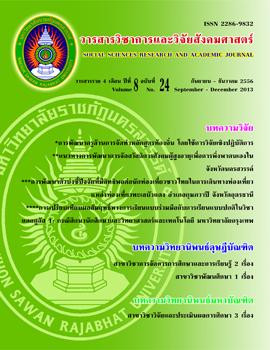การพัฒนาโปรแกรมการเรียนรู้เพื่อเสริมสร้างสุขภาวะทางจิต ของผู้สูงอายุในจังหวัดชัยนาท
Main Article Content
Abstract
บทคัดย่อ
การวิจัยครั้งนี้มีวัตถุประสงค์ดังนี้ 1) เพื่อศึกษาสุขภาวะทางจิตและปัจจัยที่ส่งผลต่อสุขภาวะทางจิตของผู้สูงอายุในจังหวัดชัยนาท 2) เพื่อพัฒนาโปรแกรมการเรียนรู้ในการเสริมสร้างสุขภาวะทางจิตของผู้สูงอายุในจังหวัดชัยนาท และ3) เพื่อทดลองใช้และศึกษาประสิทธิภาพของโปรแกรมการเรียนรู้เพื่อเสริมสร้างสุขภาวะทางจิตของผู้สูงอายุในจังหวัดชัยนาท โดยการดำเนินการวิจัยครั้งนี้มีลักษณะเป็นการวิจัยและพัฒนา แบ่งออกเป็น 3 ระยะ กลุ่มตัวอย่างที่ใช้ในการวิจัย ได้แก่ ผู้สูงอายุในจังหวัดชัยนาท จำนวน 200 คน ผู้ทรงคุณวุฒิ 11 คน และ ผู้เชี่ยวชาญ ในการประเมินคุณภาพของโปรแกรมการเรียนรู้ 5 คน เครื่องมือที่ใช้ในการวิจัย ได้แก่ แบบสอบถาม สถิติที่ใช้ในการวิจัย ได้แก่ ความถี่ ร้อยละ ค่าเฉลี่ย ค่าเบี่ยงเบนมาตรฐาน ค่าสัมประสิทธิ์สหสัมพันธ์เพียร์สัน การวิเคราะห์ถดถอยเชิงพหุ การวิเคราะห์เนื้อหา และการเปรียบเทียบค่าเฉลี่ยของกลุ่มตัวอย่าง
ผลการวิจัยพบว่า
1. ผู้สูงอายุในจังหวัดชัยนาท มีสุขภาวะทางจิตอยู่ในระดับปานกลาง และปัจจัยที่ส่งผลต่อสุขภาวะทางจิตของผู้สูงอายุ ได้แก่ ตัวแปรการสนับสนุนทางสังคม พฤติกรรมการดูแลตนเองด้านสุขภาพจิต เพศชาย รายได้ และสถานภาพหย่าร้าง/แยกกันอยู่ ตามลำดับ โดยตัวแปรดังกล่าวสามารถร่วมกันทำนายสุขภาวะทางจิตของผู้สูงอายุได้
ร้อยละ 64
2. โปรแกรมการเรียนรู้เพื่อการเสริมสร้างสุขภาวะทางจิตของผู้สูงอายุในจังหวัดชัยนาท มีองค์ประกอบสำคัญ คือ แนวคิด/หลักการ วัตถุประสงค์ โครงสร้างกระบวนการ เทคนิค/ สื่อ/ วัสดุอุปกรณ์ และการวัดและประเมินผล สำหรับผลการประเมินคุณภาพโดยผู้เชี่ยวชาญ พบว่า ในภาพรวมมีคุณภาพในด้านความเหมาะสม ด้านความครอบคลุม ด้านความเป็นไปได้ และด้านความเป็นประโยชน์ อยู่ในระดับมากทุกด้าน
3. หลังการทดลองใช้โปรแกรมการเรียนรู้เพื่อเสริมสร้างสุขภาวะทางจิตของผู้สูงอายุ มีค่าเฉลี่ยสุขภาวะทางจิตเท่ากับ 3.66 ซึ่งสูงกว่าเกณฑ์ที่กำหนด อย่างมีนัยสำคัญทางสถิติที่ระดับ .05 นอกจากนี้ยังพบว่า ผู้สูงอายุมีความพึงพอใจต่อการนำโปรแกรมการเรียนรู้เพื่อเสริมสร้างสุขภาวะทางจิตของผู้สูงอายุในจังหวัดชัยนาทไปใช้ ในภาพรวม อยู่ในระดับมากที่สุด
Abstract
The aims of this research were 1) to study psychological well-being and the factors that affect the psychological well-being of the elderly in Chainat province, 2) to develop the learning management program to enhance the psychological well-being of the elderly, and 3) to test the effectiveness of the learning management program to promote the psychological well-being of the elderly. This study was a research and development research (R&D) which was divided into 3 phases. The sample was 200 elderly people who were recruited by a multi-stage sampling in Chainat Province. Moreover, eleven experts and five specialists were invited to brain storm and evaluate the quality of the learning management program. The instruments were questionnaires. The data were analyzed using frequency, percentage, mean, standard deviation, Pearson's correlation coefficient, multiple regression analysis, content analysis and compare means of the sample group.
The results revealed that
1. Psychological well-being scores of the elderly were moderate. The factors associated with psychological well-being of the elderly were social support, self-care behaviors in psychological well-being, male, income, and marital status (divorce / separation). Such variables could predict the psychological well-being of the elderly for 64 percent.
2. The learning management program was developed with the important elements including concepts/ principles, objectives, structure, processes, techniques / media / materials, measurement and evaluation. For the quality of the program which was evaluated by the experts, the result showed that, overall, of the program was suitable, comprehensive, possible, and useful. The level scores of all these aspects were high.
3. The efficiency of the learning management program to promote the psychological well-being of the elderly was 3.66 which was higher than the set criterion at a statistically significant level of .05. In addition, the elderly who enrolled in the program reported that, overall, they were satisfied with the application of the program at the highest level.


